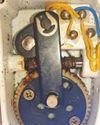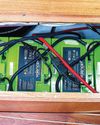Try GOLD - Free
Understanding electrics: switches and relays
Practical Boat Owner
|Summer 2023
Pat Manley and Oliver Ballam demystify boat electrics, starting with switches and relays
-

Switches allow a circuit to be 'made' or 'broken' so that a light, motor or whatever can be activated or isolated.
A switch has at least one pair of contacts that can be made or broken but it can be much more complicated. It can make or break several circuits at a time, or can be made to switch between one or more circuits, either individually or in unison.
Obviously the DPDT (double pole, double throw) switch may also be found with a centre OFF position.
Some switches might be latching (stay where they are put-like a domestic light switch) or momentary (return to off when pressure is released-like a horn switch). You don't have to use all the terminals, so you can tailor the switch to suit your circuit.

Switches may have solder terminals or 'spade' terminals, the latter being easier to install in boat circuits as you can use crimp terminals to fit the wires.
Troubleshooting switches
You can check the operation of a switch using a multimeter-with the switch 'open' the resistance should be infinite and with the switch 'closed' the resistance should be zero.
This story is from the Summer 2023 edition of Practical Boat Owner.
Subscribe to Magzter GOLD to access thousands of curated premium stories, and 10,000+ magazines and newspapers.
Already a subscriber? Sign In
MORE STORIES FROM Practical Boat Owner

Practical Boat Owner
An adventure to St Kilda
Marsali Taylor swaps skippering her Offshore 8m for being crew on a converted herring drifter, with comfy berths in the former fish hold
8 mins
January 2026

Practical Boat Owner
Mast refit and upgrade
Nicholas Koligiannis explains how he improved the mast on his Albin Ballad
5 mins
January 2026

Practical Boat Owner
Making more noise in fog
Nick Tyler takes the guesswork out of broadcasting fog signals
3 mins
January 2026

Practical Boat Owner
Solo across the Pacific
Triple amputee Craig Wood sailed into the history books with a non-stop, 90-day, 7,506-mile unassisted voyage
8 mins
January 2026
Practical Boat Owner
Al-assisted Shipping Forecasts
The Met Office has released new data showing a decade of steady improvement in the UK Shipping Forecast, with wind speed and sea state accuracy up by 10% or more.
1 min
January 2026

Practical Boat Owner
Bligh-ted reputation
Making the case for the mutiny on the Bounty's much maligned Captain Bligh
3 mins
January 2026

Practical Boat Owner
Wiper motor repair
Richard Stone mends his deck saloon windscreen wipers
2 mins
January 2026

Practical Boat Owner
'Let someone know boat plans' says report into fatal man overboard incident
The importance of designating a shore contact before setting off on a boat trip has been highlighted following a fatal man overboard incident near Inishbofin, Co. Galway, Ireland.
1 mins
January 2026

Practical Boat Owner
LITHIUM BATTERIES latest safety advice
Marine engineer and surveyor Marcus Jones unpicks the confusion surrounding the use of lithium batteries and what you should consider if installing them on board your boat
8 mins
January 2026

Practical Boat Owner
How to winterise your motor boat
Jon Mendez explains the steps you need to take to ensure your boat stays in top condition for next season
4 mins
January 2026
Translate
Change font size
